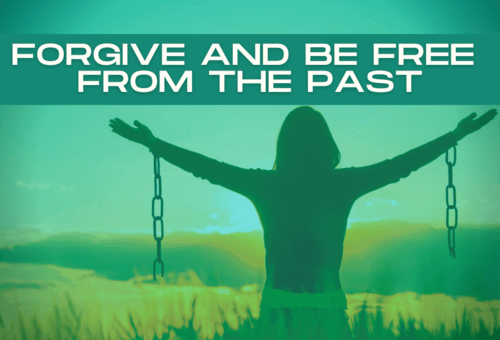Visiting the past is an inevitable aspect of the human experience, yet it often serves as a double-edged sword. While memories can evoke nostalgic warmth, they also harbor lingering pain, poignant regrets, and unresolved grievances. The Bahá’í teachings provide profound insights into the intricate processes of forgiveness and healing, illustrating how one can transcend the shackles of the past and embrace a renewed perspective on existence. This exploration will elucidate the principles underpinning forgiveness, the transformative power of healing, and the ways in which these concepts interlace with the tenets of Bahá’í thought.
At the heart of Bahá’í teachings lies a profound understanding of unity. Every individual is seen as an integral part of humanity, and this realization fosters compassion and empathy towards others, even those who have caused pain. The first step in visiting the past involves acknowledging these shared experiences. By understanding that every action, whether perceived as negative or positive, ultimately contributes to the collective human experience, one can begin to redefine relationships with past grievances.
Forgiveness is not merely a passive act; it is a conscious choice. It requires a deliberate shift in perspective that allows one to see the broader picture of human imperfection. The Bahá’í writings suggest that acknowledging the fallibility of individuals—including oneself—is vital for cultivating an environment where forgiveness can flourish. When this awareness is nurtured, the weight of resentment and bitterness begins to dissipate, making way for healing and reconciliation.
Interestingly, forgiveness in the Bahá’í context is also about self-liberation. Many grapple with the notion that forgiving others equates to excusing harm. However, Bahá’í principles advocate for the necessity of understanding forgiveness as an act that ultimately benefits the forgiver. By releasing the chains of past grievances, individuals can liberate themselves from the burdens that weigh heavily on their souls, thus fostering emotional and spiritual well-being. Letting go of past grievances does not dilute the significance of the offense; rather, it reclaims one’s power and vitality.
Subsequently, healing is an essential complement to forgiveness. It is the process through which the soul and spirit regain their equilibrium after experiencing turmoil. In Bahá’í thought, healing involves holistic engagement—mind, body, and spirit. This integrative approach underscores the importance of self-care practices and spiritual reflection as means to cultivate inner peace. Engaging in prayer, meditation, or community service can facilitate this healing process by fostering a connection to a higher purpose and collective humanity.
The act of forgiving also enhances interpersonal relationships, fostering unity and collaboration within diverse communities. When individuals embody forgiveness, they become catalysts for change, inspiring others to reflect on their own pasts and the healing that can ensue. This divine quality of forgiveness, as posited in Bahá’í teachings, is a reflection of the infinite mercy and compassion inherent in the Creator. Ultimately, this practice promotes global harmony and cooperation, addressing the root causes of discord and division.
Forgiveness within the context of the Bahá’í faith is closely tied to two pivotal concepts: justice and mercy. The relationship between these principles is intricate, as true forgiveness does not negate justice; rather, it amplifies mercy. Forgiving unconditionally, in alignment with Bahá’í teachings, does not imply the absence of consequences for actions but instead enacts a deep, moral imperative that prioritizes reconciliation over retribution. This nuanced understanding compels individuals to seek restorative solutions rather than punitive measures, thus promoting a culture of empathy and understanding.
As one navigates the often-treacherous waters of revisiting the past, it is essential to approach it with a spirit of humility and openness. Bahá’í writings encourage adherents to cultivate an attitude of detachment from the negative emotions associated with past experiences. By adopting a reflective stance, individuals can examine life’s trials as opportunities for growth rather than as burdens to bear. This reorientation challenges the notion that one is a mere product of their past; instead, it posits them as architects of their future.
Involving community can further enhance the process of forgiveness and healing. Bahá’í teachings emphasize the importance of cultivating positive relationships, fostering environments where individuals can share their stories and experiences. Such communal engagement allows individuals to witness the transformative power of collective healing, serving as a testament to the efficacy of forgiveness when unleashed within a supportive network. Discourse and dialogue become tools of reconciliation, paving the way for newfound understanding and kinship.
Finally, the practice of gratitude can serve as a profound ally in the journey of revisiting the past. Acknowledging the lessons learned from past experiences—no matter how painful—facilitates a sense of appreciation for growth and resilience. Bahá’í teachings encourage adherents to recognize the silver linings present even in the darkest moments of their lives. When one embraces a stance of gratitude, healing is not merely a goal but a state of being that radiates outward, positively affecting those around them.
In conclusion, the process of visiting the past to forgive and heal is a complex yet transformative endeavor within the Bahá’í framework. By fostering a sense of unity, emphasizing the significance of forgiveness, and integrating holistic healing practices, individuals can navigate their histories with grace and purpose. Ultimately, this journey transcends personal grievances, fostering a ripple effect of compassion and understanding within the broader tapestry of humanity, illuminating the path towards a harmonious future.
